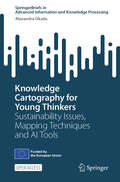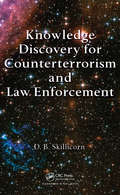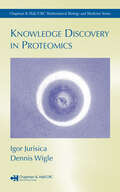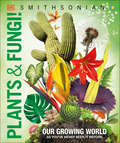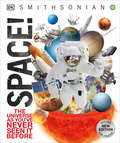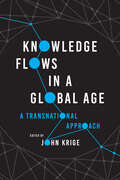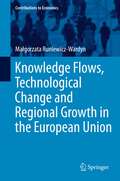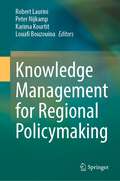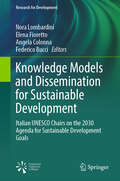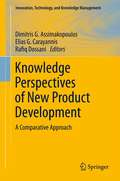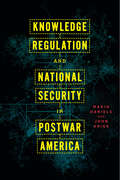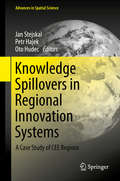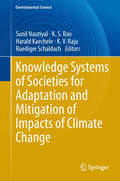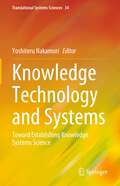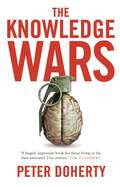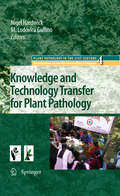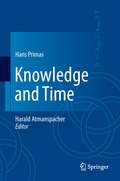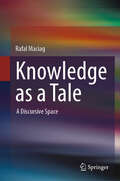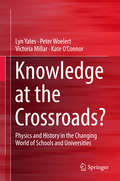- Table View
- List View
Knowledge And Mind: A Philosophical Introduction
by Andrew Brook Robert J. StaintonThis is the only contemporary text to cover both epistemology and philosophy of the mind at an introductory level.
Knowledge Cartography for Young Thinkers: Sustainability Issues, Mapping Techniques and AI Tools (Advanced Information and Knowledge Processing)
by Alexandra OkadaDiscover the transformative power of knowledge mapping with this revolutionary book. You will have access to a rich collection of mapping techniques, technologies, and real-life applications designed for learners of all ages and across disciplines. This book aims to help learners create knowledge with the support of artificial intelligence mapping apps and engage them deeply with sustainable development supported by green digital skills. Experience the dynamic world of mind maps, concept maps, dialogue maps, and more, brought to life by educators, researchers, experts, and young students. This is not just a book; it is a movement toward diverse, interactive learning methods to shape a sustainable future. Perfect for teachers, trainers, nonformal educators, and education professionals, the book embraces the innovative CARE-KNOW-DO framework to transform how young people tackle pressing issues. It combines exploration, understanding, and actionable steps for sustainability. This book offers invaluable resources to help researchers explore trends, connect relevant information, and produce significant narratives supported by AI. It guides the use of knowledge maps in decision-making, sense-making, and inspiring future generations. The book also explores the methodology behind its creation, including case studies, teaching strategies, and learning outcomes, all of which are grounded in extensive literature and ethical standards. Embrace a new era of learning with this open-access book on knowledge mapping. It is set to transform the way we think, research, teach, and learn. It is an open access book.
Knowledge Discovery for Counterterrorism and Law Enforcement (Chapman & Hall/CRC Data Mining and Knowledge Discovery Series)
by David SkillicornMost of the research aimed at counterterrorism, fraud detection, or other forensic applications assumes that this is a specialized application domain for mainstream knowledge discovery. Unfortunately, knowledge discovery changes completely when the datasets being used have been manipulated in order to conceal some underlying activity. Knowledge Dis
Knowledge Discovery in Proteomics
by Igor Jurisica Dennis WigleMulti-modal representations, the lack of complete and consistent domain theories, rapid evolution of domain knowledge, high dimensionality, and large amounts of missing information - these are challenges inherent in modern proteomics. As our understanding of protein structure and function becomes ever more complicated, we have reached a point where
Knowledge Encyclopedia Plants and Fungi
by DKExplore the wonderful world of plants and fungi, with everything from cacti and carnivorous plants to trees, flowers, and mushrooms.Why are flowers colorful and fruits sweet? How does a carnivorous plant kill its prey? Why do stinging nettles sting? How do trees turn light into food? This ultimate nature book for children will fascinate young readers with its microscopic detail and amazing facts on the plant world. Children aged 9+ will find themselves totally absorbed in the complexities nature, made clear through engaging explanations, intricate illustrations, vivid photographs, and striking 3D images. Knowledge Encyclopedia: Plants and Fungi! teaches kids all about plants and fungi by showing how they work with beautiful illustrations. Peer inside a leaf, watch a seed sprout, follow a root underground, and see how a flower becomes a fruit.This all-encompassing nature encyclopedia for kids offers: A whole collection of facts, charts, timelines, and illustrations that cover a vast range of topics.Plants and fungi from around the world shown using amazingly detailed CGIs that entice young readers to dive in and explore.Important STEM topics covered in life sciences curricula.A visual approach using illustrations, photographs and extremely detailed 3D CGI images.Knowledge Encyclopedia: Plants and Fungi! shows how plants and fungi form the foundations of every ecosystem, making our planet habitable. Life on Earth couldn&’t exist without plants and fungi. Plants create the food we eat and the oxygen we breathe. They regulate the climate, provide habitats for animals, and produce sustainable resources that we can use to make books, clothes, furniture and houses. Fungi are just as important.Every page is packed with incredible facts and statistics. Did you know that the seeds of the Australian snottygobble plant don&’t grow until they&’ve been pooed out by emus? Or that the world&’s oldest tree began growing before the pyramids were built?More in the SeriesKnowledge Encyclopedia Plants and Fungi! is part of DK&’s visual and informative Knowledge Encyclopedia series. Complete the collection and dive into the deep with Knowledge Encyclopedia Ocean!, take a trip to the solar system with Knowledge Encyclopedia Space! and travel back to prehistoric times with Knowledge Encyclopedia Dinosaur!
Knowledge Encyclopedia Space!: The Universe as You've Never Seen it Before (DK Knowledge Encyclopedias)
by DKA spacetastic new edition beaming with incredible pictures and the latest facts about the universe.From the origin of the universe to the future of space rockets, this book about space for kids has it all.Did you know that the moon was once a piece of the Earth, and that a day on Venus is longer than one year? First published in 2015, Knowledge Encyclopedia: Space! has been completely revised and updated for 2020, with new images and information on all things space-related to send you rocketing to the furthest reaches of the cosmos. Newly updated with the latest scientific discoveries and innovation in space engineering, this new title will answer all your questions about what lies beyond the night sky. Discover how stars and galaxies are formed, take a trip through the Milky Way, and explore the innards of the International Space Station in this incredible book that uses the latest computer-generated 3-D imagery, eye-catching photographs, gripping information, and explanatory diagrams to bring the wonders of the cosmos to life.Knowledge Encyclopedia: Space! is the big bang of space books, and it's just gotten bigger!
Knowledge Flows in a Global Age: A Transnational Approach
by John KrigeA transnational approach to understanding and analyzing knowledge circulation. The contributors to this collection focus on what happens to knowledge and know-how at national borders. Rather than treating it as flowing like currents across them, or diffusing out from center to periphery, they stress the human intervention that shapes how knowledge is processed, mobilized, and repurposed in transnational transactions to serve diverse interests, constraints, and environments. The chapters consider both what knowledge travels and how it travels across borders of varying permeability that impede or facilitate its movement. They look closely at a variety of platforms and objects of knowledge, from tangible commodities—like hybrid wheat seeds, penicillin, Robusta coffee, naval weaponry, seed banks, satellites and high-performance computers—to the more conceptual apparatuses of plant phenotype data and statistics. Moreover, this volume decenters the Global North, tracking how knowledge moves along multiple paths across the borders of Mexico, India, Portugal, Guinea-Bissau, the Soviet Union, China, Angola, Palestine and the West Bank, as well as the United States and the United Kingdom. An important new work of transnational history, this collection recasts the way we understand and analyze knowledge circulation.
Knowledge Flows in a Global Age: A Transnational Approach
by John KrigeA transnational approach to understanding and analyzing knowledge circulation. The contributors to this collection focus on what happens to knowledge and know-how at national borders. Rather than treating it as flowing like currents across them, or diffusing out from center to periphery, they stress the human intervention that shapes how knowledge is processed, mobilized, and repurposed in transnational transactions to serve diverse interests, constraints, and environments. The chapters consider both what knowledge travels and how it travels across borders of varying permeability that impede or facilitate its movement. They look closely at a variety of platforms and objects of knowledge, from tangible commodities—like hybrid wheat seeds, penicillin, Robusta coffee, naval weaponry, seed banks, satellites and high-performance computers—to the more conceptual apparatuses of plant phenotype data and statistics. Moreover, this volume decenters the Global North, tracking how knowledge moves along multiple paths across the borders of Mexico, India, Portugal, Guinea-Bissau, the Soviet Union, China, Angola, Palestine and the West Bank, as well as the United States and the United Kingdom. An important new work of transnational history, this collection recasts the way we understand and analyze knowledge circulation.
Knowledge Flows in a Global Age: A Transnational Approach
by John KrigeA transnational approach to understanding and analyzing knowledge circulation. The contributors to this collection focus on what happens to knowledge and know-how at national borders. Rather than treating it as flowing like currents across them, or diffusing out from center to periphery, they stress the human intervention that shapes how knowledge is processed, mobilized, and repurposed in transnational transactions to serve diverse interests, constraints, and environments. The chapters consider both what knowledge travels and how it travels across borders of varying permeability that impede or facilitate its movement. They look closely at a variety of platforms and objects of knowledge, from tangible commodities—like hybrid wheat seeds, penicillin, Robusta coffee, naval weaponry, seed banks, satellites and high-performance computers—to the more conceptual apparatuses of plant phenotype data and statistics. Moreover, this volume decenters the Global North, tracking how knowledge moves along multiple paths across the borders of Mexico, India, Portugal, Guinea-Bissau, the Soviet Union, China, Angola, Palestine and the West Bank, as well as the United States and the United Kingdom. An important new work of transnational history, this collection recasts the way we understand and analyze knowledge circulation.
Knowledge Flows, Technological Change and Regional Growth in the European Union
by Małgorzata Runiewicz-WardynThe book provides conceptual and empirical insights into the complex relationship between knowledge flows and regional growth in the EU. The author critically scrutinizes and enhances the RIS (Regional Innovation System) approach, discussing innovation as a technological, institutional and evolutionary process. Moreover, she advances the ongoing discourse on the role of space and technological proximity in the process of innovation and technological externalities. The book closes with an investigation of the role of technological change and knowledge spillovers in the dynamic growth and "catching-up" of EU regions.
Knowledge Management for Regional Policymaking
by Peter Nijkamp Karima Kourtit Robert Laurini Louafi BouzouinaThe present publication focusses the attention on new avenues in regional information and knowledge management, while we will zoom in particularly on the potential promises and hurdles of digital technology. This digital challenge has already generated a wealth of implications in the area of smart or intelligent cities, but as yet far less has been achieved in the field of regional planning and regional science. There is clearly a need for a more systematic and wide-ranging assessment and presentation of emerging approaches and concepts in this field, for instance, in regard to principles (e.g. geographic rule modeling), methodologies (e.g. blockchain systems), data analytics (e.g. machine learning) and data governance (e.g. data sovereignty) of regional information and knowledge. Especially in our ‘big data’ era, a systematic, comprehensible and reliable acquisition, storage, sharing and handling of data (e.g. on the basis of systematic decomposition and filtering principles) is more needed than ever before. The present study seeks to present a selection of state-of-the-art contributions on advanced – often digitally-oriented – regional information and knowledge management foundations, principles and practices written by several experts in the field of spatial informatics. These contributions were collected with a view to the design of a comprehensive knowledge and research agenda, which was discussed during a brainstorm workshop in Lyon, France (October 2021). This book covers various fields of interest, such as GeoAI, knowledge modelling, IoT and scalability, space syntax, rule extraction, data governance and data self-sovereignty. It is concluded with a knowledge and research agenda outlining future endeavors in the field of the spatial information sciences (or spatial informatics).
Knowledge Models and Dissemination for Sustainable Development: Italian UNESCO Chairs on the 2030 Agenda for Sustainable Development Goals (Research for Development)
by Nora Lombardini Elena Fioretto Angela Colonna Federico BucciThis book delves into the invaluable contributions made by the Italian UNESCO Chairs toward addressing the intricate and pressing global challenges of our era. Established within the UNITWIN/UNESCO Chairs program initiated by UNESCO in 1992, these Chairs serve as vital links between the realms of academic research and civil society. They offer a conduit for disseminating knowledge, thereby advancing the objectives of global development. By facilitating the transfer and adoption of scientific methodologies through intellectual collaboration, they strive to enhance the sustainability and resilience of both individual communities and society at large. Through a series of dialogues, the Italian UNESCO Chairs critically examine the challenges inherent in this mission, the objectives they aim to achieve, the strategies employed in scientific research, and the development of novel areas of study. They approach these endeavors with a conscientious and responsible mindset, recognizing them as essential responses to the multifaceted issues arising in our rapidly evolving world. The contributions put forth by the Italian UNESCO Chairs serve as practical tools for the implementation of the 17 Sustainable Development Goals, making them relevant to various stakeholders. These include not only citizens, scholars, public and private institutions, research centers, and administrators but also anyone with an interest in tackling the challenges of sustainable development in our everyday lives.
Knowledge Perspectives of New Product Development
by Elias G. Carayannis Dimitris G Assimakopoulos Rafiq DossaniNew Product Development (NPD) is about the ideation, formulation, and implementation of new and superior solutions in the market. Beyond the obvious need for organizations to innovate in order to compete, embedded in any NPD program are knowledge, technological expertise, and the social networks that convert these capabilities into offerings that create value at every level--for customers, industries, communities, and regions. This volume provides an array of knowledge perspective in NPD across multiple levels of analysis and geographic regions, including Europe, the United States, China, Japan, and India, to explore the dynamics of NPD in today's global environment. Presenting case studies from such industries as ICT services, semiconductors, software development, bio-technology, higher education, and even safety for children's toys, and drawing from a variety of theoretical perspectives, including technology and knowledge management, sociology, economic geography, and organizational behavior, the authors highlight critical success and failure factors in NPD. Among the topics covered: New product development teams, including multi-functional and multi-site teamsDe-localization and off-shoring of tasks and processesIndividual competencies and organizational capabilitiesUniversity-industry interactions, high-tech clusters, and technology transfer Technology policy
Knowledge Regulation and National Security in Postwar America
by John Krige Mario DanielsThe first historical study of export control regulations as a tool for the sharing and withholding of knowledge. In this groundbreaking book, Mario Daniels and John Krige set out to show the enormous political relevance that export control regulations have had for American debates about national security, foreign policy, and trade policy since 1945. Indeed, they argue that from the 1940s to today the issue of how to control the transnational movement of information has been central to the thinking and actions of the guardians of the American national security state. The expansion of control over knowledge and know-how is apparent from the increasingly systematic inclusion of universities and research institutions into a system that in the 1950s and 1960s mainly targeted business activities. As this book vividly reveals, classification was not the only—and not even the most important—regulatory instrument that came into being in the postwar era.
Knowledge Regulation and National Security in Postwar America
by John Krige Mario DanielsThe first historical study of export control regulations as a tool for the sharing and withholding of knowledge. In this groundbreaking book, Mario Daniels and John Krige set out to show the enormous political relevance that export control regulations have had for American debates about national security, foreign policy, and trade policy since 1945. Indeed, they argue that from the 1940s to today the issue of how to control the transnational movement of information has been central to the thinking and actions of the guardians of the American national security state. The expansion of control over knowledge and know-how is apparent from the increasingly systematic inclusion of universities and research institutions into a system that in the 1950s and 1960s mainly targeted business activities. As this book vividly reveals, classification was not the only—and not even the most important—regulatory instrument that came into being in the postwar era.
Knowledge Regulation and National Security in Postwar America
by John Krige Mario DanielsThe first historical study of export control regulations as a tool for the sharing and withholding of knowledge. In this groundbreaking book, Mario Daniels and John Krige set out to show the enormous political relevance that export control regulations have had for American debates about national security, foreign policy, and trade policy since 1945. Indeed, they argue that from the 1940s to today the issue of how to control the transnational movement of information has been central to the thinking and actions of the guardians of the American national security state. The expansion of control over knowledge and know-how is apparent from the increasingly systematic inclusion of universities and research institutions into a system that in the 1950s and 1960s mainly targeted business activities. As this book vividly reveals, classification was not the only—and not even the most important—regulatory instrument that came into being in the postwar era.
Knowledge Spillovers in Regional Innovation Systems: A Case Study Of Cee Regions (Advances in Spatial Science)
by Jan Stejskal Petr Hajek Oto HudecThis book provides an assessment of the evolution and dynamics of regional innovation systems (RISs) and the economic and social impact of resulting knowledge spillovers, presenting comparative case studies on the regions of several Central and Eastern European (CEE) countries (Czech Republic, Poland, Hungary, Slovakia, Lithuania and Estonia).It analyses RISs on the basis of several dimensions, such as absorption capacity and intellectual capital, and using several methods such as data envelopment analysis, patent network analysis, and weighted sum approach.Further, by looking at the economic and social impact of knowledge spillovers in RISs and networking, it identifies key distinguishing factors, including foreign direct investments, still prevalent centralized decision-making, EU-driven innovation policies and public financing of innovations. Sectoral case studies, e.g. from the automobile, chemical and other hi-tech manufacturing industries, are presented to help readers understand the different types of knowledge spillovers in CEE countries and the evolution and dynamics of RISs, and provide a multifaceted overview of the CEE regions.
Knowledge Systems of Societies for Adaptation and Mitigation of Impacts of Climate Change
by K. V. Raju Sunil Nautiyal Ruediger Schaldach Harald Kaechele K. S. RaoClimate change is broadly recognized as a key environmental issue affecting social and ecological systems worldwide. At the Cancun summit of the United Nations Framework Convention on Climate Change's 16th Conference, the parties jointly agreed that the vulnerable groups particularly in developing countries and whose livelihood is based on land use practices are the most common victims as in most cases their activities are shaped by the climate. Therefore, solving the climate dilemma through mitigation processes and scientific research is an ethical concern. Thus combining the knowledge systems of the societies and scientific evidences can greatly assist in the creation of coping mechanisms for sustainable development in a situation of changing climate. International Humboldt Kolleg focusing on "knowledge systems of societies and Climate Change" was organized at ISEC. This event was of unique importance, as the year 2011-12 was celebrated as the 60th Anniversary of Diplomatic Relations between India and Germany with the motto "Germany and India - Infinite Opportunities." This volume is the outcome of the papers presented during the IHK 2011 at ISEC, India.
Knowledge Technology and Systems: Toward Establishing Knowledge Systems Science (Translational Systems Sciences #34)
by Yoshiteru NakamoriThis book discusses technology and systems to create valuable ideas from data through the construction of knowledge. The primary concern is to make better decisions about economic and management issues in today’s information-flooded society. Human creative activity is in the realm of soft technology, with no physical entity to operate. Focusing on the ability of knowledge as judgment power, this definition results: “Knowledge technology is soft technology that underpins the human creative activities of converting data and information into knowledge, creating new ideas based on that knowledge and validating those ideas.” That definition includes a wide range of soft technologies developed in informatics, management studies, and systems science. The knowledge system creates ideas from data and knowledge through knowledge technologies. Based on the proposition that knowledge emerges by the interaction between explicit and tacit knowledge, another definition is possible: “The knowledge system is a system that promotes interaction between codified and personalized knowledge and creates ideas for solving a specific problem.” Codified knowledge includes data and information, while personalized knowledge is empirical knowledge or wisdom that is difficult to put into words. Building a knowledge system requires mathematical or intelligent knowledge technology and participatory knowledge technology to create or manage codified knowledge and personalized knowledge. For example, a company builds cross-sectional knowledge systems by gathering human resources from various departments, according to the purpose, as in new product development or sales promotion. Chapter 1 defines knowledge technology and the knowledge system and organizes the challenges in their development, while Chapters 2 through 9 introduce mathematical or intelligent knowledge technologies by researchers at the forefront of knowledge technology development.
Knowledge Wars
by Peter DohertyClimate scientists have warned that we need to change our behaviour in ways that may be inconvenient and threaten the commercial status quo. The result has been a polarising division in society and a sustained attack on their research. In The Knowledge Wars, Nobel prizewinner Peter Doherty makes a passionate case for citizens to become informed so they are able to evaluate the facts of any scientific debate. It provides practical advice on how to analyse research and take meaningful action. The Knowledge Wars challenges our assumptions and encourages us to take an evidence-based view of the world. There's something here to offend everybody!
Knowledge and Technology Transfer for Plant Pathology
by Maria Lodovica Gullino Nigel HardwickThis book contains fuller versions of the papers and posters presented in the Knowledge and Technology Transfer and Teaching Plant Pathology sessions at the 9th International Congress of Plant Pathology held in Turin, Italy in 2008. Extension/advisory plant pathology and teaching are about relationships: the relationship between the advisor and grower and the teacher and student. It is about the building up of trust in the advice given and the enthusiasm of, and methods used by, the teacher. Extension plant pathology had been described as 'plant pathology with a human face'. It is aspects of these personal relationships that are explored in this book. Also covered are the value of participation in decision making, plant clinics and teaching approaches, both in industry and at universities. The book is aimed at those who have an interest in providing advice to farmers and growers and in teaching the subject to those who are to provide that advice.
Knowledge and Time
by Harald Atmanspacher Hans PrimasThis is a unique volume by a unique scientist, which combines conceptual, formal, and engineering approaches in a way that is rarely seen. Its core is the relation between ways of learning and knowing on the one hand and different modes of time on the other. Partial Boolean logic and the associated notion of complementarity are used to express this relation, and mathematical tools of fundamental physics are used to formalize it. Along the way many central philosophical problems are touched and addressed, above all the mind-body problem. Completed only shortly before the death of the author, the text has been edited and annotated by the author's close collaborator Harald Atmanspacher.
Knowledge and the Public Interest, 1575–1725
by Vera KellerMany studies relate modern science to modern political and economic thought. Using one shift in order to explain the other, however, has begged the question of modernity's origins. New scientific and political reasoning emerged simultaneously as controversial forms of probabilistic reasoning. Neither could ground the other. They both rejected logical systems in favor of shifting, incomplete, and human-oriented forms of knowledge which did not meet accepted standards of speculative science. This study follows their shared development by tracing one key political stratagem for linking human desires to the advancement of knowledge: the collaborative wish list. Highly controversial at the beginning of the seventeenth century, charismatic desiderata lists spread across Europe, often deployed against traditional sciences. They did not enter the academy for a century but eventually so shaped the deep structures of research that today this once controversial genre appears to be a musty and even pedantic term of art.
Knowledge as a Tale: A Discursive Space
by Rafal MaciagThis text describes the process that led to knowledge becoming the most important modern good and a complex phenomenon beginning at the end of the 19th century. It was a change in the way of understanding the world proposed by mathematics and geometry. This volume reveals how the paradigm shift, still in progress, is gradually transforming less obvious fields of science, such as the humanities and social sciences while affecting the phenomenon of knowledge. Firstly, meta-analysis gained importance, and secondly, it became natural to perceive knowledge in a social context, showing its diverse and multi-cause dispersion, leading to the phenomenon of knowledge. Due to the interpretation of knowledge as a complex social phenomenon, the author proposes a new model of knowledge description, called the theory of discursive space, making it possible to describe the role and meaning of knowledge as a component of modern civilization that is all-encompassing. This text appeals to students and researchers working in the philosophy of technology.
Knowledge at the Crossroads?
by Lyn Yates Peter Woelert Victoria Millar Kate O'ConnorThere is much discussion about what needs to change in education institutions in the 21st century, but less attention given to how core disciplinary studies should be considered within that context. This book is based on a major 4-year research study of history and physics in the changing environment of schools and universities in Australia. Are these forms of knowledge still valuable for students? Are they complementary to, or at odds with the concerns about '21st century skills', interdisciplinary and collaborative research teams, employability and 'learner-centred' education? How do those who work in these fields see changes in their disciplines and in their work environment? And what are the similarities and differences between the experiences of teachers and academics in physics and those in history? The book draws on interviews with 115 school teachers and university academics to provide new perspectives on two important issues. Firstly, how, for the purposes of today's schools and universities, can we adequately understand knowledge and knowledge building over time? Secondly, what has been productive and what has been counter-productive in recent efforts to steer and manage the changes in Australia?

